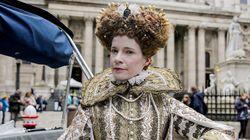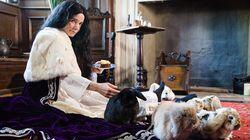Royal History's Biggest Fibs with Lucy Worsley - Season 1

Season 1

Episodes

Reformation
Lucy Worsley discovers how the history of the English Reformation has been manipulated and mythologised by generations of politicians and writers. It's usually portrayed as a lusty royal soap opera. But Lucy reveals that it was about far more than just a randy king in pursuit of a younger wife and a long-awaited male heir.
Henry's divorce from Catherine of Aragon, a Catholic, created a religious and political schism between England and Europe that can be still be felt in Britain today. It also laid the foundations for our modern constitution and economic power as an empire.
But this fundamental shift in our cultural, political, and economic fortunes wasn't driven by Henry VIII's Protestant zeal. Lucy begins by demolishing one of the founding myths about the English Reformation: far from being a ready ally of Martin Luther's Protestant revolution, Henry remained a Catholic to his death. It was his wife Anne Boleyn and his fixer Thomas Cromwell who championed the Protestant cause.

The Spanish Armada
Lucy Worsley discovers how the history of the Spanish Armada has been manipulated and mythologised by politicians and artists for generations.
This is an inspiring tale of an underdog English navy defeating an ‘invincible' Spanish fleet, the moment that set England on the path to imperial glory. Tales of Sir Francis Drake calmly finishing his game of bowls and Elizabeth I rousing her troops at Tilbury with the ‘heart and stomach of a king' have become iconic. This, however, is a story full of fibs.
Lucy explores how Elizabethan propaganda spun this as a victory for the Protestant Virgin Queen. She then finds out how the Victorians celebrated it as the start of the British Empire, the point in time when Britain truly began to rule the waves.
Right up to the present day, the defeat of the Spanish Armada has been told and retold to show Britain as an island nation destined for greatness. But what if the story of that victory is built on sand?

Queen Anne and the Union
Lucy Worsley explores how Queen Anne's reputation and legacy have been marred by a sustained campaign of historical fibs. When Queen Anne came to the throne in 1702, England looked set to be dominated by France and Spain. But Anne fought bravely to help England become a leading European power. She also helped unite England and Scotland to create Great Britain.
Anne was shy and reclusive. At first, she was supported as queen by her childhood friend and 'favourite', Sarah Churchill. However, they increasingly clashed over personal tensions and politics.
When Sarah's cousin Abigail Masham became a lady-in-waiting, she began to replace Sarah in the queen's affections. In revenge, Sarah helped pen a bawdy ballad claiming Anne and Abigail performed 'dark deeds at night'. This led to endless rumours about Anne's sexuality that persist to this day.
In the end, Sarah was dismissed. Thirty years after Anne's death, Sarah took further revenge by publishing a tell-all story of her time as the queen's favourite. Her portrait of Anne, as a foolish and stubborn woman, has been taken on board by most historians. But Lucy finds it is full of fibs.
Hollywood used Sarah's version of history to create 2019's The Favourite, destroying Queen Anne's reputation for a whole new generation. Lucy reveals Anne to have been a smarter, more successful queen than history has ever acknowledged.
Recently Updated Shows

Saturday Night Live
Saturday Night Live is an Emmy Award-winning late-night comedy showcase.
Since its inception in 1975, "SNL" has launched the careers of many of the brightest comedy performers of their generation. As The New York Times noted on the occasion of the show's Emmy-winning 25th Anniversary special in 1999, "in defiance of both time and show business convention, 'SNL' is still the most pervasive influence on the art of comedy in contemporary culture." At the close of the century, "Saturday Night Live" placed seventh on Entertainment Weekly's list of the Top 100 Entertainers of the past fifty years.

General Hospital
General Hospital, which celebrated its golden anniversary on April 1, 2013, continues its tradition of passion, intrigue and adventure that takes place in the fictional town of Port Charles in upstate New York. The glamour and excitement of those who have come to find their destinies in this familiar seaport town intertwine with the lives, loves and fortunes of beloved, well-known faces. As always, love, danger and mind blowing plot twists continue to abound on General Hospital with contemporary storylines and unforgettable characters.

The Curse of Oak Island
The Curse of Oak Island documents brothers Rick and Marty Lagina as they pursue their lifelong dream of solving more than a 220-year old Oak Island mystery. For over two centuries, teams of searchers, including Franklin D. Roosevelt, have attempted to crack the code that will unearth the treasure believed to be buried on the small island off the coast of Nova Scotia. Armed with the knowledge of those that came before them, the muscle of heavy machinery and decades of engineering know-how, the Lagina's and their partners may be closer than anyone in history to finding the treasure that has so far claimed the lives of six men.

Bad Monkey
Bad Monkey tells the story of Andrew Yancy, a one-time detective demoted to restaurant inspector in Southern Florida. A severed arm found by a tourist out fishing pulls Yancy into the world of greed and corruption that decimates the land and environment in both Florida and the Bahamas. And yes, there's a monkey.

Brilliant Minds
Inspired by the extraordinary life and work of world-famous author and physician Oliver Sacks, Brilliant Minds follows a revolutionary, larger-than-life neurologist and his team of interns as they explore the last great frontier - the human mind - while grappling with their own relationships and mental health.